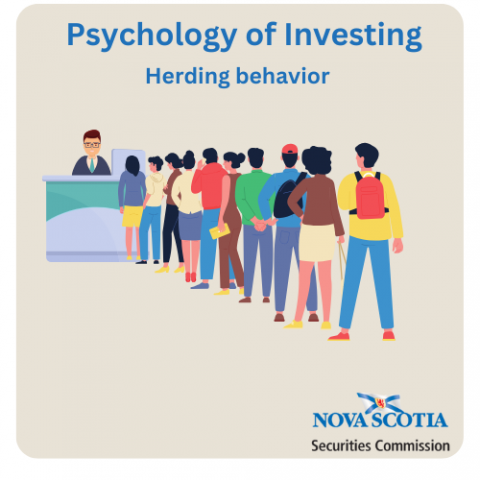Submitted by nsscadmin on

The second part of our Psychology of Investing series takes a closer look at herding behaviour. Everyone likes to think they are their own person and that they would not get swept up in what is popular or trendy. However, psychologically most people do like to follow the crowd and be one among the many. This is known as herding behaviour and it can often influence our investing habits, sometimes negatively.
Herding does not just affect our investment decisions. We also see the herding effect in people cheering for the same sports team, mass-purchasing the latest fad product (remember Cabbage Patch dolls, Pogs, and Fidget spinners), or Internet crazes (Ice Bucket Challenge, Gangnam Style, Spotify Wrapped). A recent example of herding behaviour in the investing realm would be the Meme Stocks craze a few years ago. If you do not remember, take a look at the roller coaster ride valuation of GameStop throughout 2021.
How can herding impact your financial and investing decisions? We already mentioned the Meme Stock craze from 2021. During that time there were several investors who made lots of money. However, there were just as many, if not more investors, who followed the herd to a massive investment loss.
One way that herding can often hurt an investor is by starting a run of panic buying or selling of investments. Does the evidence and the facts available backup the decision to buy or sell the investment? Do you have the information necessary to backup the investment decision or are you simply following everyone else who is buying or selling? Herding behaviour can also cause investors to take on more risk than they may be comfortable with or even able to take on because they are following the herd.
If you have lost money due to herding before or think you may be susceptible to this behaviour, here are a few ways to protect yourself from following the herd to ruin.
- Question the herd before making a decision
Do not blindly follow the herd without questioning what they are investing in. Is this investment sound and practical? Is the hype the herd is following real? Does the investment fit your investment goals and risk tolerance? Taking a minute to pause and evaluate the decision can protect you from blindly following the herd.
- Focus on the long-term
Decisions made based on herding behaviour are made impulsively and emotionally, and often focus on the short-term, here and now. Remember to think about your long-term goals and long-term financial situation. Does this decision fit into it, or could it harm it?
- Develop and know your financial plan and goals
Both of our protection solutions so far have involved financial plans and financial goals. However, to use them effectively and follow them they first need to exist and you must know what they are. Take the time to develop your financial plan and know it well enough to not only follow it but also know whether an investment opportunity aligns with your financial goals and is right for you.
Our Psychology of Investing series continues in two weeks with Part 3, which looks at overconfidence bias.
